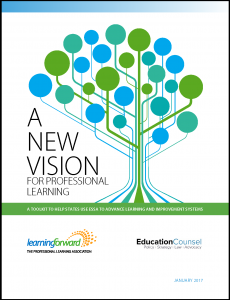
Learning Forward Advocacy
Events are unfolding rapidly. Stay tuned to this advocacy page for the latest information.
Education leaders are calling on the U.S. Department of Education to immediately release more than $2 billion in Title II funding that school districts across the country are depending on for professional learning, teacher recruitment, leadership support, and educator effectiveness initiatives.
In a letter addressed to Secretary of Education Linda McMahon, a coalition of 31 prominent public education and advocacy organizations—including Learning Forward—pressed the department to swiftly allocate the $2.19 billion authorized for Title II, Part A (Title II-A) under the Elementary and Secondary Education Act (ESEA) for fiscal year 2025. The funding was approved by Congress and signed into law by President Trump as part of the FY25 Continuing Resolution on March 15.
When President Trump signed the resolution, thousands of school districts were finally able to finalize their budgets for the 2025-26 school year, with the understanding that Title II-A funding would remain level. Any reductions or changes to those allocations at this point would have a devastating impact on students, educators, and communities nationwide.
In many states, districts are legally mandated to provide professional development or induction programs. Without Title II-A funds allocated as Congress intended, districts would be forced to cut essential student services to remain compliant—leading to impossible budget decisions, potential staff layoffs, and the loss of critical educator support systems.
The coalition is also urging the administration to follow the funding allocation formula specified in the FY 2024 Further Consolidated Appropriations Act, citing Congressional intent and the immediate financial needs of school systems.
The letter highlights the persistent inequities that Title II helps address:
“Decades of research show that students in high-poverty schools are more likely to be taught by inexperienced teachers. Title II-A – Supporting Effective Instruction State Grants – helps close these gaps by increasing students’ access to highly qualified, effective educators.”
The program provides vital resources for school districts to strengthen and support their workforce:
“Title II-A provides essential resources to help current teachers build their skills and expertise through high-quality professional development, while also funding induction and mentoring programs that support new educators and help retain them in the profession. Additionally, districts can leverage these funds to meet their local needs—like reducing class sizes, providing additional certifications for teachers to expand offerings for students, or building a principal and school leader pipeline.”
An article in Politico about this letter included a comment from the education department: “The Department is currently finalizing its fiscal year 2025 spending plan, which it will submit to Congress by the April 29 deadline.”
Executive Order on closing the Department of Education
A-Team federal update, February, 2025
Join the Learning Forward A-Team in 2025 for regular policy updates
The Learning Forward Advocacy Team is your trusted source for news and updates on federal education policy, particularly the latest news on Title II-A. Signing up for the A-Team will ensure that you receive:
- Access to the latest education policy news through email updates
- An invitation to join a monthly 30-minute Zoom call for a federal update with opportunity to get your specific questions answered (2nd Tuesday of every month at 5 p.m. ET)
- Counsel on local and state policy needs from Learning Forward’s policy team
Sign up today using this link. No advocacy experience required – just information. Stay informed. Join the A-Team today.
Learning Forward Advocacy
Powered by Title II
Communities & members
Resources
Video: How is professional learning important for students?
Call to action: Save Title II-A
Now is not the time to be complacent. We need to remain vigilant in our efforts to save Title II-A. If you are reading this message, please take a moment to send a message to your members of Congress.

Learning Forward’s Powered by Title II campaign website puts all of the information, tools, and advocacy tutorials in one easy to access online location to enable educator advocates reach their Members of Congress and help convince them to support more Title II funding. On this site, advocates will find:
- The latest news on Title II
- Background facts, stories, research, and data on Title II
- A storytelling tool to assist you in researching and explaining how Title II supports your school district
- Sample letters, talking points, tweets and more to support your advocacy
Evidence, evidence, evidence
Evidence of impact is not optional. From your ESSA plans to Title II to talking with your district superintendent, everyone wants to know when professional development is making an impact and how you know. Learning Forward is here to help. We invite you to join your peers from across the U.S. to share your successes here.
Tell us what Title II funds in your school or district, and most important, what outcomes you see as a result. Outcomes might include improved graduation rates or assessment scores, improvements for specific populations of students, or other indicators that students are experiencing more meaningful learning.
This webinar, originally created for our Virtual Advocacy Day, includes advocacy strategies and tips that are applicable to any advocacy effort. Watch to hone your skills, build confidence, and get excited about being an advocate.
ESSA Toolkits
 A New Vision For Professional Learning: A Toolkit to Help
A New Vision For Professional Learning: A Toolkit to Help
States Use ESSA to Advance Learning and ImprovementSystems. This toolkit helps leaders leverage professional learning as
an essential tool in overcoming systemic inequities and guaranteeing
excellence for all.
Agents for Learning Toolkit: A Guide to Amplifying Teacher
Voice and Stakeholder Engagement. This toolkit suggests ways to cultivate teacher voice and agency in policy decisions and the implementation of professional learning.


